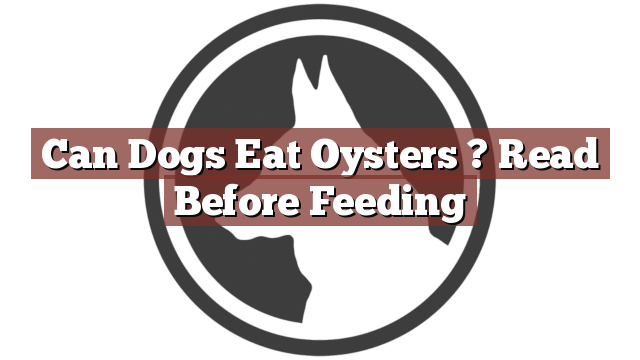Understanding Your Dog’s Dietary Needs
As a responsible dog owner, it is crucial to understand your furry friend’s dietary needs. While dogs are primarily carnivorous animals, their diet can also consist of some fruits, vegetables, and grains. However, not all human foods are safe for dogs to consume. Certain foods can be toxic and lead to severe health issues. Therefore, it is essential to research and be aware of what foods are safe and appropriate for your dog’s consumption.
Can Dogs Eat Oysters? Read Before Feeding
One common question that arises is, "Can dogs eat oysters?" The answer to this question is no. While oysters are considered a delicacy for humans and are packed with various nutrients, they are not suitable for dogs. Oysters can pose several risks and potential health problems for dogs if consumed.
Pros and Cons of Feeding Oysters to Dogs
Feeding oysters to dogs may have some potential benefits, but the risks outweigh any potential advantages. Oysters are a rich source of protein, vitamins, and minerals such as zinc, iron, and omega-3 fatty acids. These nutrients can contribute to a shiny coat, healthy skin, and improved immune system in dogs. However, the cons of feeding oysters to dogs are significant.
Firstly, oysters can contain harmful bacteria, such as Vibrio vulnificus or Vibrio parahaemolyticus, which can cause severe gastrointestinal issues in dogs. These bacteria can lead to symptoms like vomiting, diarrhea, abdominal pain, and even life-threatening conditions in some cases. Secondly, oysters are often served raw or undercooked, which increases the risk of bacterial contamination even further.
Another concern is the high sodium content in oysters. Dogs have different sodium requirements compared to humans, and excessive sodium intake can lead to issues like dehydration, kidney problems, and high blood pressure in dogs. Additionally, oysters can be a choking hazard or cause blockages in a dog’s digestive system, especially if they are served whole.
Conclusion: Weighing the Risks and Benefits of Oyster Consumption for Dogs
In conclusion, while oysters may offer certain nutritional benefits, the risks associated with feeding them to dogs outweigh any potential advantages. The potential bacterial contamination, high sodium content, and choking hazards make oysters an unsuitable food for dogs. It is always recommended to consult with your veterinarian before introducing any new food into your dog’s diet. Your veterinarian can provide you with a comprehensive understanding of your dog’s dietary needs and recommend safe and appropriate food options to keep your furry friend healthy and happy.
Thank you for taking the time to read through our exploration of [page_title]. As every dog lover knows, our furry friends have unique dietary needs and responses, often varying from one canine to another. This is why it's paramount to approach any changes in their diet with caution and knowledge.
Before introducing any new treats or making alterations to your dog's diet based on our insights, it's crucial to consult with a veterinarian about [page_title]. Their expertise ensures that the choices you make are well-suited to your particular pet's health and well-being.
Even seemingly harmless foods can sometimes lead to allergic reactions or digestive issues, which is why monitoring your dog after introducing any new food item is essential.
The content provided here on [page_title] is crafted with care, thorough research, and a genuine love for dogs. Nevertheless, it serves as a general guideline and should not be considered a substitute for professional veterinary advice.
Always prioritize the expert insights of your veterinarian, and remember that the health and happiness of your furry companion come first.
May your journey with your pet continue to be filled with joy, love, and safe culinary adventures. Happy reading, and even happier snacking for your canine friend!

